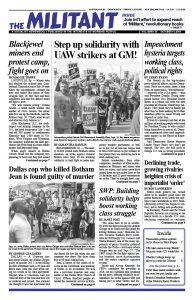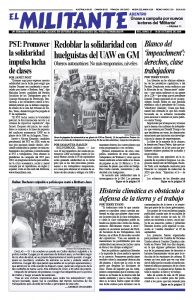World trade growth has turned down to its weakest point since the global financial crisis shook the capitalist rulers worldwide in 2007. Manufacturing activity has begun to contract, led by falling auto production.
In Germany, Russia and the Czech Republic factories are running at the lowest levels in a decade. U.S. manufacturing contracted as consumer spending and business investment is slowing.
Trade tensions and rising tariff barriers are adding to the cooling global economy. This has raised capitalist investors’ fears that the next economic crisis is near and they’re scurrying to find safer bets for investment.
This deepening capitalist crisis and heightened competition is fueling the disintegration of the old imperialist global order put in place after Washington’s bloody victory in the second imperialist world slaughter. The U.S. rulers remain by far the dominant capitalist power, despite clear signs of their decline.
The veneer of a “rules-based” world order and relatively stable multilateral institutions marked earlier decades of Washington’s era — like the U.N., which gave its sponsorship to the U.S. rulers’ war in Korea, the World Trade Organization and others.
This facade is being pulled apart at the seams. The imperialist competitors’ problems are being foisted on working people at home and in the semicolonial world.
The growing rivalry between the rising Chinese capitalist class and the U.S. ruling families has accelerated over the past decade of protracted crisis. This strategic conflict over which ruling class will come out on top in the 21st century is over the division and redivision of the spoils from plundering the earth’s resources and the wealth produced by workers and farmers worldwide.
“No force can stop the Chinese people and the Chinese nation from forging ahead,” Chinese President Xi Jinping said at the parade celebrating 70 years since the founding of the People’s Republic Oct. 1. That same day, cops and thugs backed by Beijing were assaulting protesters for political rights in Hong Kong, shooting one.
The global capitalist economy is now the most interdependent — and the most overleveraged — it has ever been. The international debt mountain has more than doubled from a high of $116 trillion in 2007 before the global financial crisis to $244 trillion today. During the same time, the global total of gross domestic products has grown by only half from $58 trillion to $85 trillion. With growing idled productive capacity, deflationary pressures are increasing.
The European Union is being torn apart from within by competing national interests of the rulers and from without by the polarizing rivalry between Beijing and Washington. In May, German Chancellor Angela Merkel — who is on the way out as chief executive officer of German capital — acknowledged that “the old certainties of the postwar order” are over. One of the central problems facing the German rulers is they have only a fifth-rate military, having relied on Washington for decades for defense. The same is true of all the European ruling classes.
Threat of a ‘currency war’
“Threats to European integration are mounting,” was the headline of an article by Wolfgang Munchau in the Aug. 11 Financial Times. He noted the bloc of capitalist powers called the European Union now faces “an economic downturn, a global currency war, a technology shock in the car sector, possibly a no-deal Brexit and an Italian government crisis.”
Munchau warns the capitalist rulers in Europe risk “a vicious circle during the next downturn or financial crisis” with already low interest rates. The Italian government, he notes, is threatening to free itself from EU fiscal rules and to set up a parallel currency, which it could devalue more freely. Manchau suggests that the economic argument for integration has been weakened, perhaps mortally, “after the devastating experience of austerity in southern Europe.”
And he says the “real threat to European integration” will come “from the EU’s voters.” From workers in the U.K. who voted overwhelmingly to get out of the EU to this year’s yellow vest protests in France, the rulers’ fears of the working class are growing.
On top of growing tariff disputes, there now is a much more serious threat of an all-out currency war. On June 18, European Central Bank President Mario Draghi announced that the ECB was prepared to cut interest rates and restart bond buying as an economic stimulus weapon aimed at the U.S. dollar in hopes of seizing more of the world market.
Draghi’s remarks were challenged by President Donald Trump as “immediately drop[ping] the Euro against the Dollar, making it easier to compete against the U.S.A. They have been getting away with this for years, along with China and others.” The threat to respond in kind, and more, was clear. Effects of a spiraling currency battle would reverberate worldwide.
Working people will pay the piper whichever country’s capitalist class claws its way to the top. The only alternative for working people is to unite and fight for their own independent class interests, to build a revolutionary leadership capable of replacing today’s dictatorship of capital with workers power.

